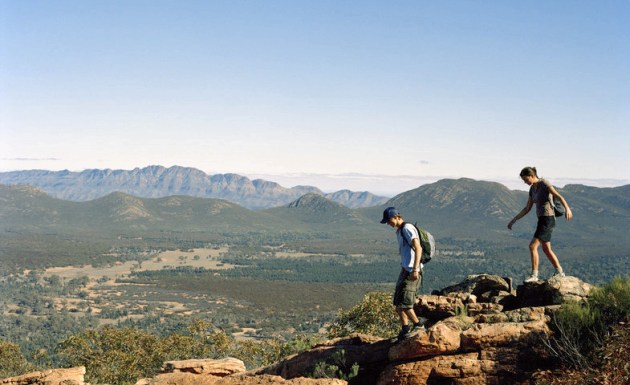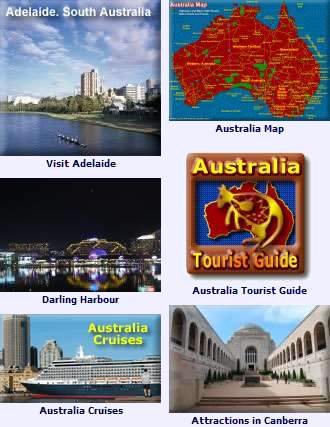Australia Tourist Guide -> South Australia Tourist Guide -> Flinders Ranges SA and The Outback

Photo: On the Mt Ohlssen Bagge Hike, Flinders Ranges

South Australia Places
Adelaide Surrounds
- Adelaide Surrounds
- Adelaide Hills SA
- Barossa Valley SA
- Clare Valley SA
- Murraylands Riverlands
- Murraylands Cruises
SA Regions
- Eyre Peninsula SA
- Fleurieu Peninsula
- Flinders Ranges & The Outback
- Kangaroo Island SA
- Neptune Islands, SA
- Limestone Coast SA
- Riverland South Australia
- Renmark
- Yorke Peninsula
National Parks
- South Australia National Parks
- Adelaide Park Lands
- SA Parks
- Coorong National Park
- The Arkaba Walk - Flinders Ranges
- Coffin Bay National Park
- Flinders Chase National Park
- Port Lincoln National Park
- Rawnsley Park, South Australia
- Witjira National Park
- Botanic Garden
SA Tourist Guide
Adelaide Australia Tourist Guide
Beaches of Adelaide
Adelaide Attractions
- Adelaide’s Chinatown
- South Australian Museum
- Squares of Adelaide
- Rundle Mall
- Best Places in South Australia
Adelaide Things to Do
- Adelaide Kids Fun
- Adelaide History South Australia
- Adelaide Historical Places of Interest
- Places to Shop in Adelaide
Adelaide Information
- City Public Transport
- Accommodation Adelaide Hotels South Australia
- Institute of South Australia
- Adelaide Travel Deals, Hotels, Airline, Car Hire
- Adelaide Weather and Forecasts
Wine Regions
Australia Tourist Guide -> South Australia Tourist Guide -> Flinders Ranges SA and The Outback
Mobile Version: Mobile


Flinders Ranges SA and The Outback
See the Ranges on the map South East South Australia Map.
The Flinders Ranges, named after the colonial explorer Matthew Flinder, is a three hour drive from Adelaide. Here, in the Outback there are chances to fossick for opals, explore abandoned mines, see aboriginal sites dating back thousands of years and journey through a timeless landscape, by rail, on foot and 4WD.
Opals and Coober Pedy
Coober Pedy, 842kms from Adelaide, is renowned as the Opal capital of the world but is remarkable in more ways than that. You can stay overnight in an underground hotel, even play at a golf course without any grass.
Nearby are the Moon Plains, The Breakaways and a dog fence over 5300 kilometres long! But don’t forget to see the gem shops or try your own hand at fossicking for the precious gems yourself.
Flinders Ranges Natural Park
The Flinders Ranges Natural Park, with its gorges, purple ridges, gum lined creeks and waterfalls is home to much wildlife and diverse native flora.
Wilpena Pound is a huge hand shaped natural feature of razor edged purple mountains. There are many little trails that explore this beautiful park with its lush valleys and deep gorges. Further north are the Gammon Ranges with the Arkaroola Wilderness Sanctuary.
Flinders Ranges Fauna
The Outback
Travelling in the Outback means being prepared. The sometimes extreme conditions and the long distances involved means you should always acquire local advice before venturing out.
It can be very hot in the summer months of December to February, while the nights can get very cold so you will need extra clothing.
If you venture off the main roads you may find service stations, stops, or even sources of water few and far between. Therefore always get local advice.
Tours
There are the comfortable bus tours or you can be more adventurous with 4WD treks through the region. At Port Augusta, Pichi Richi Railway gives you a chance to see the wonderful scenery of the Central Flinders Ranges in restored historic 115 year old train carriages.
During the cooler months there are a number of bush walk guided tours available. One of the great walks of Australia: The Arkaba Walk.
Accommodation
Numerous hotels, motels, caravan parks, cottages and stations offer accommodation to suit almost any budget. There are also plenty of camp sites in the conservation areas.
Coober Pedy
Even stay at the underground hotel in Coober Pedy, a cool way to spend a hot mid-day. In the cooler months, it may be wise to book ahead.
Restaurants and Eateries
Sample the local fare at many eateries, hotels and restaurants in the larger towns such as Quorn, Melrose, Wilmington, Port Augusta.
Kangaroo and other bush tucker, washed down with a great Coonawarra or McLaren Vale wine can be an memorable experience of your South Australian Outback journey.
Driving in the Outback
When driving in the Outback (remote regions), it is important to keep track of road conditions and weather conditions: Outback Roads. Note, always seek reliable local advice before proceeding.
Australian Wine Regions
Other well known Australian wine regions include:
Work, Jobs in South Australia
Why not try a working holiday in South Australia - Work in Australia.
South Australia Hotels and Accommodation
South Australia accommodation - Australia Hotels, Motels and Accommodation.
Search the Australia Tourist Guide
Photo: Emu, Flinders Ranges